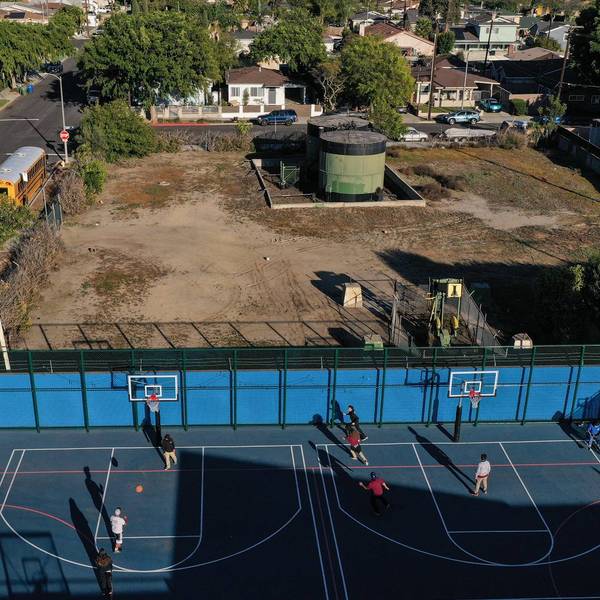A climate researcher based in Kiel, Germany said Monday that he was prepared to lose his job at a globalization think tank, after his employer gave him an ultimatum and demanded he go against his climate-based objection to aviation travel in order to return to his place of work—a requirement at least one critic said was rooted in retaliation for the scientist's activism.
Gianluca Grimalda has been working on a field assignment in Papua New Guinea for the past six months, studying the relationship between globalization, climate change, and social cohesion for his employer, the Kiel Institute for the World Economy (IfW). He traveled to Papua New Guinea without the use of airplanes and has planned to get back to Germany the same way, boarding cargo ships, ferries, trains, and coaches to avoid 3.6 tonnes of carbon emissions.
Grimalda was originally scheduled to be finished with his work on September 10, but said in an essay on Monday that he received permission from the head of his department to remain in Papua New Guinea after wrapping up the project and noted that he is able to complete his work while traveling.
Nevertheless, on Friday the president of IfW informed Grimalda that he was required to be back in Kiel on Monday, which would require him to board a plane—a demand that he said ignores the climate impact of aviation travel and the effects already being felt by communities across the globe, including in Papua New Guinea.
"Traveling by plane would produce around four tons of carbon dioxide—the greenhouse gas responsible for global warming," wrote Grimalda. "In my outbound journey, I limited my emission to two tons by traveling over land and sea for 35 days over 16,0000 of the 22,000 kilometers. In my inbound journey I plan to cover the entire distance without catching a plane, which would limit carbon dioxide emissions to 400 kilograms—ten times less than traveling by plane."
By resolving to carry out his "slow-travel" plans instead of flying back to Kiel, Grimalda said he is risking his job.
"I know that most people would swallow the bitter pill, take a plane, and go ahead with their work—both as a professional and as an activist," wrote Grimalda. "With this job, I have enough economic stability and spare time to pursue environmental causes. Nevertheless, I believe that we have reached the point where instrumental rationality is no longer applicable. The most recent scientific evidence says that we have transgressed six out of nine planetary boundaries and that several ecosystems are close to collapse (or likely past their point of collapse) because of temperature rise—in turn caused by greenhouse gases emissions."
Grimalda acknowledged that his individual refusal to support the airline industry is no match for the continued emissions of the sector as well as fossil fuel giants, industrial farming, and other corporate actors.
"My decision not to catch a plane will mean close to nothing for the protection of the environment," he wrote. "'That plane will fly even if you have not boarded it,' many people have already told me. This is true, but giving less money to the aviation industry may mean fewer planes in the future. In any case, all the science I know, all the evidence I see, point to the fact that we are in [an] emergency. In [an] emergency, extraordinary actions should be taken. That is why, with enormous sadness, I have decided not to take a plane and face all the consequences this will lead to."
"I am prepared to pay this price, if it helps raising awareness among the public and the societal leadership on the desperate situation we are in," Grimalda added. "It is my act of love to the current and future generations, to the animal species under threat of extinction, to the idea of humanity that I instinctively and undeservedly abide by."
Grimalda and direct action group Scientist Rebellion went public with the researcher's dilemma on the same day the Institute for Policy Studies (IPS) in the U.S. released a report on private jet travel out of Laurence G. Hanscom Field near Boston, the largest private aviation field in New England.
Constrasting with Grimalda's commitment to reduce his support for carbon-intensive activities, IPS found that over 18 months, private jet owners and operators were responsible for an estimated 106,676 tons of carbon emissions, with half of those flights used for recreational or luxury travel. More than 40% of the flights were less than an hour long.
Climate groups in the area are currently pushing to ensure developers don't expand Hanscom in order to avoid even more planet-destroying emissions.
Grimalda told Scientist Rebellion that IfW has withheld his pay for the month of September without notice.
Julia Steinberger, a lead author of the latest report by the International Panel on Climate Change—which reiterated that "human activities, principally through emissions of greenhouse gasses, have unequivocally caused global warming" and warned that "approximately 3.3 to 3.6 billion people live in contexts that are highly vulnerable to climate change"—said it was "extraordinary that a research institute threatens to dismiss a researcher for doing his job too diligently and for avoiding flying during a climate emergency."
She added that she believes IfW aims to "retaliate for Gianluca's past participation in civil disobedience on climate change with Scientist Rebellion."
Grimalda has taken part in actions such as a blockade of the entrance of a biofuel refinery controlled by Eni, Italy's energy company.
The researcher expressed hope that his latest action "will sound yet another alarm bell to the ears of an inactive political leadership."
"As a scientist, I feel I have the moral responsibility to be proactive in sounding such alarms," Grimalda wrote. "It is true that thus far hundreds, if not thousands, of protests have all but gone unheard and have changed very little. Nevertheless, 'social tipping points' have existed for much progressive social change and things have changed rapidly for the good after a critical mass of support has been garnered."




